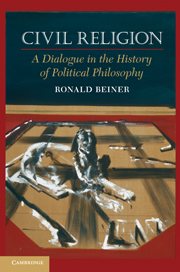Book contents
- Frontmatter
- Contents
- Preface and Acknowledgments
- Introduction
- Part I Machiavelli, Hobbes, Rousseau
- Part II Responses to (and Partial Incorporations of) Civil Religion within the Liberal Tradition
- Part III Theocratic Responses to Liberalism
- 25 Joseph de Maistre
- 26 Maistrean Politics
- 27 Maistre and Rousseau
- 28 Carl Schmitt's “Theocratic” Critique of Hobbes
- Part IV Postmodern “Theism”
- Conclusion
- Index
- References
28 - Carl Schmitt's “Theocratic” Critique of Hobbes
Published online by Cambridge University Press: 05 June 2012
- Frontmatter
- Contents
- Preface and Acknowledgments
- Introduction
- Part I Machiavelli, Hobbes, Rousseau
- Part II Responses to (and Partial Incorporations of) Civil Religion within the Liberal Tradition
- Part III Theocratic Responses to Liberalism
- 25 Joseph de Maistre
- 26 Maistrean Politics
- 27 Maistre and Rousseau
- 28 Carl Schmitt's “Theocratic” Critique of Hobbes
- Part IV Postmodern “Theism”
- Conclusion
- Index
- References
Summary
Like the serpent that slithered onto the scene after the bucolic description of Adam and Eve in the garden, Hobbes's Leviathan slithered and seemed to choke off Christianity.
– A. P. MartinichThe intellectual dialogue between Carl Schmitt and Thomas Hobbes in Schmitt's 1938 Hobbes book is one of the most bizarre episodes in the history of political philosophy, and raises questions that are central to the three-way debate (civil religion, liberalism, and theocracy) laid out in this book. Schmitt rightly sees a moment of liberalism in Hobbes's civil religion, and according to Schmitt's perverse reading, Hobbes is taxed with responsibility for what Schmitt sees as a “Jewish” intellectual–political legacy of cosmopolitanism, liberalism, and Enlightenment. One could say that Schmitt's Hobbes-interpretation, for all of its perversity, fits nicely with the view of civil religion I am developing in this book – namely that civil religion and liberalism ultimately have more in common with each other than either has with real theocracy, because both civil religion and liberalism aim at a domestication of religion on behalf of the political state (or what Schmitt calls “public reason”). A fully theocratic civil religion would leave no space for anything other than unreserved deference to the civil-religious unity embodied in the state's absolute sovereignty. The core of Schmitt's interpretation is that Hobbes betrayed his own theocratic political philosophy and contaminated it with the virus of liberalism that was to unfold fully in the eighteenth and nineteenth centuries. Schmitt calls it “the seed of death that destroyed the mighty leviathan from within”!
How is this quirky reading of Hobbes related to Schmitt's own political philosophy? In what follows, I have tried to answer this question. Nevertheless, in trying to draw a core political philosophy from the Hobbes book, it is quite possible that I have attributed more coherence to Schmitt's political thought than it actually possesses. Schwab, the coeditor, cites the view of Helmut Rumpf that the Hobbes book is hobbled by a fundamental incoherence: “[B]ecause Schmitt's formulations can be interpreted as a critique of the totalitarian system as well as ‘a totalitarian critique of Hobbes,’ it is difficult to conclude where Schmitt actually stood.” It is indeed true that the antiliberal spirit of the book comes out most clearly in the hateful outbursts, whereas the actual philosophical standpoint is highly blurred, to say the least. One is tempted to say that it was only when he was ranting that Schmitt was able to achieve intellectual clarity.
- Type
- Chapter
- Information
- Civil ReligionA Dialogue in the History of Political Philosophy, pp. 359 - 368Publisher: Cambridge University PressPrint publication year: 2010
References
- 1
- Cited by

